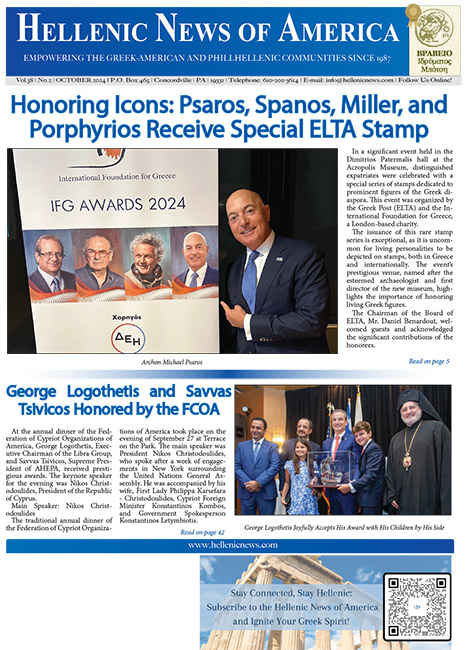By: AURELIA
The occasion was a poetry reading on January 16, 1999 in the Cornelia Street Café, New York City, by Nancy Horton, daughter of the late Honorable George Horton, eyewitness to the Asia Minor Catastrophe, and Catherine Sacopoulos Horton of Smyrna, Turkey. The room was filled to capacity by devotees of Miss Horton who came to hear her poetry and stories about her father’s life.
The reading had just ended when a gentleman rose and walked toward the podium. With a tender gesture befitting the historic occasion, the elderly man approached Ms. Horton, bowed deeply before her, trembled visibly, then took her hand and kissed it. Because his act reflected sincere homage, it was a defining moment. It underscored the bond that existed between Greeks and Armenians and Ms. Horton, the “Keeper of the Flame,” for her father’s heroic deeds and memory.
Sadly, Miss Horton passed away Thursday morning, February 18 in Ygeia Hospital, Marousi, Greece.
Miss Horton had homes in Voula and in Washington, D.C. She was an accomplished poet and translator of Modern Greek poetry and former President of The Federal Poets. The reading she gave was under the sponsorship of the Greek American Writers Association and its purpose was to honor her and the memory of her father.
George Horton was U.S. Consul General in the Near East in 1922 when the ancient, mainly Greek populated city of Smyrna was burned by Turkish troops. He saved many lives at the risk of his own and chronicled the destruction of the City in his seminal book, The Blight of Asia, considered “sacred” by many.
Although Miss Horton lived in Voula for most of the last decade of her life, she also maintained a home in Washington, D.C. where was well known for her poetry readings. She had a large and loyal following and gave readings at the Folger Shakespeare Library in
Washington, D.C., spoke on BBC, appeared frequently on Greek television, and lectured extensively on Asia Minor in the United States, Greece, and Australia. Her poetry was included in The Anthology of Best College Poetry, The Saturday Review of Literature, and several prestigious poetry journals.
Besides being a poet of note, Miss Horton received many honors in recognition of her father’s legacy. She was guest speaker at St. George Cathedral in Philadelphia and was presented with the Medal of Excellency. Soon after, she was flown to Sacramento, CA., to speak at The Speros Bassil Vryonis Center.
A highlight of her life occurred in the early 1990s when a statue of her father was unveiled in Nea Smyrni, a suburb of Athens, where many survivors of the Asia Minor Catastrophe live. An Athens street was also named after him.
Fluent in Greek and French as well as German and Italian, Miss Horton spent many years of her life giving poetry readings and her works have been published in numerous periodicals, including the American Foreign Service Journal. She held a bachelor’s degree from The American University and Sweet Briar College in Virginia and began graduate work at both the University of Birmingham and Harvard University where she pursued studies toward a master’s degree in English Literature. She left for Europe before finishing her graduate work and studied languages there.
An accomplished poet, she was past president of The Federal Poets and an active member of the Athens-based English Poetry Society at Compendium in Syntagma. While in Athens, she wrote for the English language paper, The Athens News, and in Washington, D.C. she was editor for various periodicals. She was known, also, as a philanthropist, an academician, a humanist, and a passionate supporter of animal rights. Visitors to her home in Voula would be greeted by stray dogs she had saved from life in the streets of Athens.
Nancy Horton inherited her father’s gracious qualities, his compassion for others, his love of nature, and his spiritual connection with Greece. “My father felt there was an intensity about Greece that you find nowhere else,” she said, “and I believe he was correct.” She added, “There is something mystical about this land—a supernatural quality that marks the spot where spirits live.”
Since her father’s death in 1942, Miss Horton became her father’s emissary and kept the flame of his memory and deeds eternal. When the late Hagop Khrimian, the Armenian gentleman, took her hand in his and kissed it, he embraced the hand of her venerable father as well. He kissed the hand of history—the hand of Smyrna, the Christian City, Smyrna, the Glorious city, Smyrna, the Beautiful City, Smyrna, the Martyred City.
A celebration was held in Athens on July 28, 2012, to celebrate her 100th birthday. She used that occasion to donate her father’s papers on Smyrna and her own life’s research to Georgetown University. The papers will be used by Professor Ismini Lamb of Georgetown University, in the publication of George Horton’s biography, expected in 2016. The Horton Archive will also soon be available to scholars for research.
Miss Horton was 103 years of age and died of heart failure. Plans are to hold a memorial service March 5 in Athens and another service, (date to be announced) in Washington, D.C., where she had a second home. Ms. Horton will be buried in the plot with her parents at Oak Hill Cemetery in Washington, D.C. She is survived by members of the Cuddeback and Pitkin families from her father’s previous marriages, and Andrew Leech and family from her mother’s (Saccopoulou) side.
TO TELOS (THE END)








